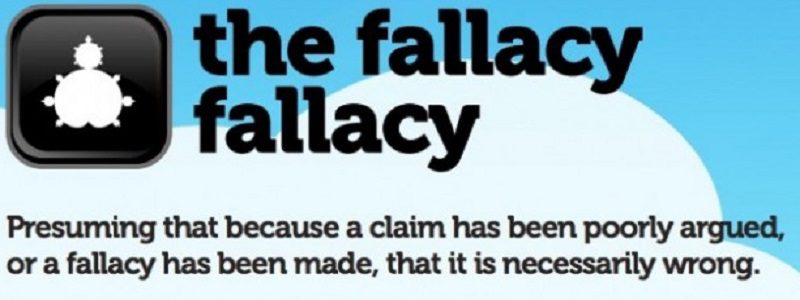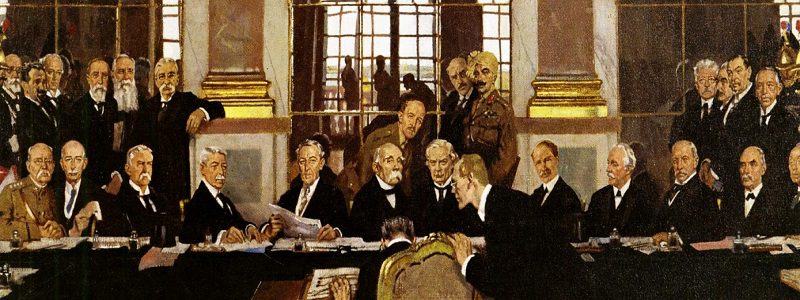Logical Fallacies: Teaching Reasoning Skills by Examining Their Absence
Many, perhaps most, critical thinking and argumentation textbooks discourage teaching logical fallacies as a stand-alone unit. John Bean, for example, in his Engaging Ideas: A Professor’s Guide to Integrating Writing, Critical Thinking, and Active Learning in the Classroom (John Wiley & Sons, 2011), cautions that students will readily forget the names and definitions of logical fallacies when learned in the abstract, and that they are best learned when blended instruction focused on argumentation about specific content.
I’ve always been persuaded by this position and we recommend it in our work with middle and high school teachers. Acquire a facility with the various types of logical fallacy, and invoke them when most applicable in your regular argument-based instruction. Still, no pedagogical guideline like this should be viewed as an absolute rule, and recently we’ve come across a website that might help teachers elevate the place of logical fallacies in their effort to improve their students’ reasoning skills.
Claudette Colvin, Civil Rights History, and Argument-Based Dramatic Interpretations
Overview
The National Book Award winning biography, Claudette Colvin: Twice Toward Justice (Macmillan, 2009), by Phillip Hoose, tells the story of a relatively unknown figure in the early Civil Rights Movement. In March of 1955 Claudette Colvin, then fifteen, enacted Montgomery, Alabama’s first bus protest, refusing to give up her seat to a white woman. She was arrested, spent several hours in jail, and was fined. Her classmates and community didn’t know exactly how to react to what she did at first – it was a spontaneous act of angry protest – though within the next nine months the bus boycott became a reality.
Debating the Actual Threat Posed by Undocumented Immigrants
Overview
The Debatifier has taken a close look at the legal immigration issue and its complexities, illustrating how the Micro-Macro Debates format can help students unpack and make sense of such a dense and multi-faceted issue, in part one and part two of an extended post. This post will help teachers take an argument-centered approach to the undocumented immigrant issue.
The estimated 11 million undocumented immigrants living in the United States, and immigration enforcement porous enough to allow the number to grow that large, have elicited a great deal of political discussion and societal debate over the past 40 years, though perhaps never so pointedly as in the 2016 presidential campaign. This argument-centered project crystallizes the question at the heart of this national debate:
Do Illegal immigrants pose a significant threat to American citizens?
Evidence Rating and the Treaty of Versailles
Regular readers of The Debatifier know that argument-centered curricular resources, projects, and activities come in all shapes and sizes. Longer-term classroom debate projects can be extremely powerful learning engines, while on a shorter, smaller scale, argumentation activities can be woven into or deployed several times over the course of any given week in any high school or middle school classroom. Educators who have the enhanced professional capacity to teach subject area content and skills objectives through academic argumentation and debate can, in a literal way, do both. They are mutually reinforcing.
We have been working with one of our partner schools’ humanities teachers on a World War I unit. The teachers wished to develop a mid-size structured argumentation component for the unit’s study of the war’s end, the controversial Treaty of Versailles.
Tackling the Immigration Issue in Micro-Macro Debates (Pt. 1)
Overview
Thanks largely to the 2016 presidential election, the immigration debate in the U.S. has exploded. What has always been a controversial and multi-faceted issue — literally since the founding of the nation — has become a politically contentious, widely-protested, and complex debate, being played out everywhere from the halls of power in D.C. to the nation’s airports to small town and mid-size city public squares to social media platforms of all kinds.
Argument-Centered Education sees in the public controversy over immigration an excellent opportunity to harness its energy, urgency, and immediacy for the benefit of social science or even informational text oriented English language arts instruction. By bringing crucial debates such as this one into our classrooms, we teach students the critical thinking and critical literacy skills that they need — that our society needs — to pursue truth, to distinguish fact from propaganda and spin, to make rational and evidence-based evaluations and judgments. Students become better citizens this way, and they are more likely to be civically engaged. And bringing debates into the classroom lets us have our cake while we eat it too: these are the same college-directed reasoning and evidence-evaluation habits of thinking that standardized testing — PARCC, Smarter Balanced, the New SAT, the PSAT, the latest iterations of the ACT — are increasingly designed around. Well-designed and effectively implemented argumentation curriculum on a complex issue like immigration is the key to both civic engagement and college readiness.






